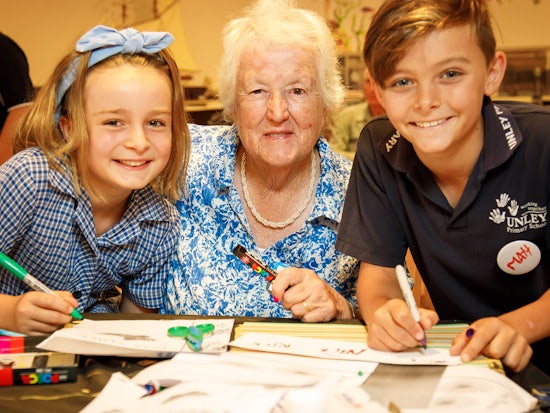Primary school program helps create dementia-friendly communities
A new intergenerational education program is helping to break through
the barriers of dementia to create dementia-friendly communities.

Unley Primary School students Zara Rodda (L) and Matthew Morrell (R) with ECH client Marie Jones (centre) (Source: City of Unley)
Developed by the University of South Australia, the program called Forget me not was designed to improve awareness and understanding of dementia among the South Australian community, starting with primary school students.
Delivered in partnership with the City of Unley, Unley Primary School and aged care provider ECH, the eight-week program teaches Year four and five Unley Primary School students about dementia.
The students also attend art collaborative art lessons together with people living with dementia at the ECH Day Program in Henley Beach.
Lead UniSA researcher, Dr Ashleigh Smith, says the immersive program will help build a dementia-friendly community.
“Dementia is a national health priority, with one in 10 people aged over 65, and three in 10 people aged over 85 living with dementia,” Dr Smith says.
Every three seconds, someone in the world is diagnosed with dementia. In Australian alone, the number of people living with dementia is projected to increase from more than 425,000 to 1.1 million by 2056. Despite its growing prevalence, dementia is often misunderstood and stigmatised.
“While many people living with dementia live well, they do benefit greatly from social interactions as these generate memories, creativity and imagination, all cognitively stimulating factors that can help slow the progression of the disease.
“The Forget me not program provides many opportunities for social interaction, and enables primary school students to learn from older people living with dementia, while the older people are able to take on a role as teachers and mentors through positive interactions.
“We’re not only building a dementia-friendly community, we’re also creating greater acceptance and understanding of a condition that affects thousands of Australian families.”
According to Unley Primary School Principal Peter O’Sullivan, the program offers significant merits to students and their families.
“With people living longer, more families are exposed to dementia and are often ill equipped to explain its complexities to their child,” Mr O’Sullivan says.
“This program teaches children lifelong skills such as communication, empathy and compassion whilst also educating them about the ever growing issue of dementia.”
City of Unley Acting Mayor Peter Hughes says that all parties are excited about the program and the potential positive impact it will have on the participants, the community and the school.
“People living with dementia report that the key to a dementia friendly community is a positive and accepting community. It is therefore important to provide opportunities for these values to be formed in children at an age when they are developing their world views,” Acting Mayor Hughes says.
“We are particularly excited to be teaching dementia education early in life and hope the program helps improve knowledge and attitudes towards dementia in the students now, and in the future.”
Currently 90 primary students from Unley Primary School are taking part in the Forget me not program. Following evaluation by the University of South Australia the program may be extended to other schools in South Australia.










